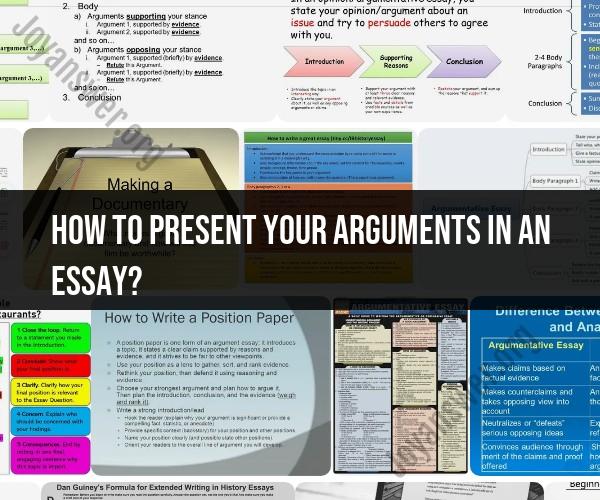How to present your arguments in an essay?
Presenting persuasive arguments effectively in an essay is essential to persuade your audience and support your thesis or main point. Here's a comprehensive guide on how to craft persuasive arguments in your essay:
1. Understand Your Audience:
- Know your target audience's beliefs, values, and potential biases. Tailor your arguments to resonate with your readers.
2. Define Your Thesis Statement:
- Clearly state your main point or thesis in the introduction. Your arguments should support and align with this central claim.
3. Conduct Thorough Research:
- Gather credible and relevant sources to support your arguments. Use a mix of primary and secondary sources, such as academic articles, books, data, and expert opinions.
4. Organize Your Thoughts:
- Outline your essay with a clear structure. Typically, an essay follows the introduction, body paragraphs (each presenting a separate argument), and a conclusion.
5. Use Persuasive Techniques:
- Employ various persuasive techniques to make your arguments more compelling:
- Logical Appeal (Logos): Use evidence, facts, statistics, and logical reasoning to support your points.
- Emotional Appeal (Pathos): Evoke emotions in your audience through anecdotes, personal stories, and vivid language.
- Ethical Appeal (Ethos): Establish credibility by citing authoritative sources and demonstrating your expertise on the topic.
6. Craft Strong Topic Sentences:
- Begin each body paragraph with a clear and concise topic sentence that previews the argument you'll present in that paragraph.
7. Provide Evidence:
- Support your arguments with relevant and credible evidence. This can include data, examples, expert opinions, and quotations.
8. Analyze and Interpret Evidence:
- Don't just present evidence; explain how it supports your argument. Analyze the significance of the evidence and its relevance to your thesis.
9. Address Counterarguments:
- Acknowledge opposing viewpoints and counterarguments. Then, refute them with strong evidence and reasoning to strengthen your own position.
10. Use Transitions:- Use transitional words and phrases (e.g., "however," "in addition," "on the other hand") to guide readers smoothly through your essay and connect your arguments.
11. Maintain Consistency:- Ensure that each argument logically flows from the previous one and contributes to the overall thesis. Avoid contradictions or abrupt shifts in tone.
12. Conclude Effectively:- Summarize your key arguments in the conclusion and restate your thesis. End with a strong, memorable closing statement that reinforces your main point.
13. Revise and Proofread:- Carefully edit and proofread your essay to eliminate errors, improve clarity, and ensure the arguments are well-structured and coherent.
14. Seek Feedback:- Share your essay with peers, instructors, or writing centers to get feedback on the persuasiveness of your arguments and the overall quality of your writing.
15. Consider the Visual Layout:- Ensure that your essay is visually appealing with clear headings, paragraphs, and formatting. Visual elements can enhance the readability of your arguments.
16. Review and Refine:- After receiving feedback, revise your essay as needed to strengthen your arguments and address any weaknesses.
Remember that effective persuasion is not about forcing your opinion on others but about presenting a well-reasoned and supported argument that allows readers to make an informed decision or consider an alternative viewpoint.












